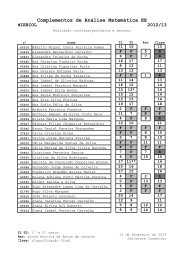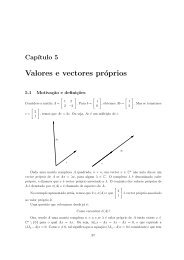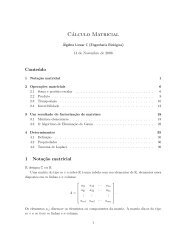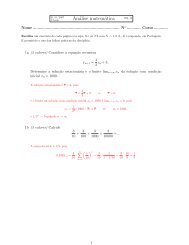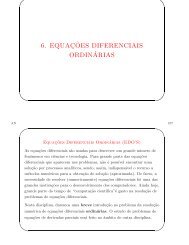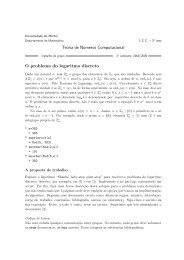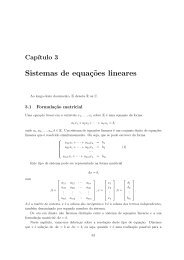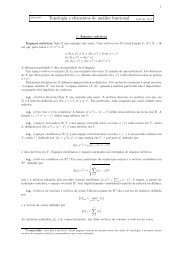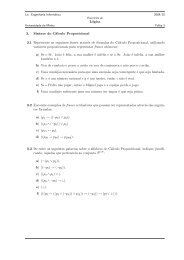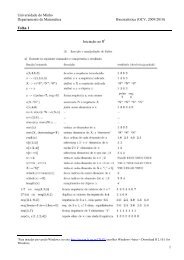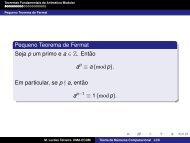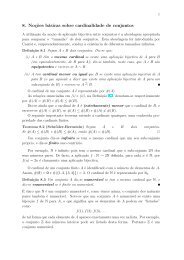My title - Departamento de Matemática da Universidade do Minho
My title - Departamento de Matemática da Universidade do Minho
My title - Departamento de Matemática da Universidade do Minho
Create successful ePaper yourself
Turn your PDF publications into a flip-book with our unique Google optimized e-Paper software.
10 STATISTICAL DESCRIPTION OF ORBITS 67<br />
A particularly important tool, taken from the theory of probability, is the conditional mean.<br />
Let (X, E, µ) be a probability space, and let F be a sub-σ-algebra of E. Given an integrable ran<strong>do</strong>m<br />
variable ϕ, there exists a unique ran<strong>do</strong>m variable ϕ F , called the conditional mean of ϕ w.r.t. F,<br />
which is F-measurable (i.e. the inverse image of any Borel set belongs to F) and such that<br />
∫ ∫<br />
ϕ F dµ = ϕdµ<br />
A<br />
for any A ∈ F. In<strong>de</strong>ed, if ϕ ≥ 0, then one can <strong>de</strong>fine ϕ F as equal to the Ra<strong>do</strong>n-Nikodym <strong>de</strong>rivative<br />
of the measure A ↦→ ∫ A ϕdµ, <strong>de</strong>fined on F, with respect to the restriction µ | F . The general case is<br />
treated by linearity, writing ϕ as a difference of two non-negative ran<strong>do</strong>m variables. Uniqueness is<br />
inten<strong>de</strong>d µ-a.e., i.e. modulo sets of zero probability. The conditional mean is monotone, namely if<br />
ϕ ≥ 0 then ϕ F ≥ 0, and preserves the mean value, since ∫ X ϕ Fdµ = ∫ ϕdµ. It can be consi<strong>de</strong>red<br />
X<br />
as a ”projection” of ϕ onto the space of F-measurable ran<strong>do</strong>m variable, preserving the mean value.<br />
In particular, if N is the trivial σ-algebra ma<strong>de</strong> of events of measure 0 or 1, then ϕ N is constant<br />
a.e. and equal to ∫ X ϕdµ.<br />
A<br />
Topological dynamical systems and Borel measures. If we are interested in the dynamics<br />
of a continuous transformation f : X → X of a topological space X, it is natural to consi<strong>de</strong>r<br />
the Borel σ-algebra B, the smallest σ-algebra of subsets of X which contain all open sets. The<br />
map f is then an en<strong>do</strong>morphism of (X, B). Probability measures on B are said Borel probability<br />
measures. If, moreover, X is a compact metric space, one can consi<strong>de</strong>r the space C 0 (X, R) of<br />
boun<strong>de</strong>d continuous real valued functions of X (observe that, since X is compact, any continuous<br />
function is automatically boun<strong>de</strong>d), equipped with the sup norm<br />
‖ϕ − ψ‖ ∞<br />
= sup |ϕ (x) − ψ (x)|<br />
x∈X<br />
These observables are clearly integrable w.r.t. to any Borel probability measure µ, and the mean<br />
value map<br />
∫<br />
ϕ ↦→ ϕdµ<br />
is a boun<strong>de</strong>d, positive <strong>de</strong>finite (in the sense that ∫ ϕdµ ≥ 0 for any ϕ ≥ 0) linear functional on<br />
X<br />
C 0 (X, R). The basic fact about Borel measures is the converse of that, namely<br />
X<br />
Riesz-Markov representation theorem . Let X be a compact metric space. Given any<br />
boun<strong>de</strong>d and positive <strong>de</strong>finite linear functional L on C 0 (X, R) such that L (1) = 1, there exists a<br />
unique Borel probability measures µ such that<br />
∫<br />
L (ϕ) = ϕdµ<br />
for any ϕ ∈ C 0 (X, R).<br />
X<br />
The space of invariant probability measures. The space Prob of probability measures on<br />
a measurable space (X, E) has a natural convex structure: convex combinations of probability<br />
measures are also probability measures. An arbitrary measurable transformation f : X → X of a<br />
measurable space may not admit any invariant probability measure. On the other si<strong>de</strong>, if µ 0 and<br />
µ 1 are invariant probability measures, so are their convex combinations µ t = (1 − t) µ 0 + tµ 1 for<br />
any t ∈ [0, 1]. This means that the set Prob f of invariant probabilty measures on E is a convex<br />
set: if it contains two points, it contains the whole segment between them.<br />
Now, let (X, d) be a compact metric space and let B its Borel σ-algebra. The space Prob of<br />
probability measures on B can be equipped with a natural topology, called the weak ∗ topology,<br />
which says essentially that two measures are near if they give nearby mean values to some well<br />
behaved observables. Formally, one says that a sequence of measures (µ n ) converge weakly* to a<br />
measure µ, which we <strong>de</strong>note simply as µ n → µ, if<br />
∫ ∫<br />
ϕdµ n → ϕdµ<br />
X<br />
X



